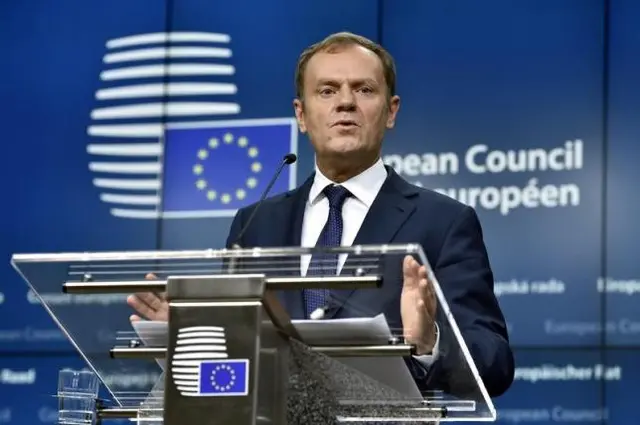European Council president Donald Tusk said on Friday that the European Union (EU) need to move forward in cooperation with Turkey to stem flows of refugees entering Europe.
"In my meeting with Prime Minister (Ahmet) Davutoglu in Ankara on Thursday, we agreed that there is good progress to report on a number of actions in our EU-Turkey Action Plan but that the number of illegal entries from Turkey to Greece remains far too high," Tusk wrote in his letters to EU leaders ahead of next Monday's EU- Turkey summit.
"We both believe that we can reduce the flow through large-scale and rapid return from Greece of all migrants not in need of international protection," Tusk said.
Turkey was one of the last stops of Tusk's tour to fix the refugee crisis, which took him to Vienna, Ljubljana, Zagreb, Skopje, Athens, Ankara, Istanbul and Belgrade from the 1st to the 4th of March.
Tusk sought to use the "shuttle diplomacy" to continue building a European consensus on how to handle the migration crisis and to prepare for the summit with Turkey on next Monday and the EU leaders' summit on March 17-18.
Tusk urged in the tour more and better coordination inside the EU. He called on member states of the EU to be prepared to massively step up the assistance to alleviate the humanitarian consequences of EU's decision, saying that it is the shared responsibility that Greece gets the help it needs.
Tusk also appealed to do everything to make the EU-Turkey action plan work and significantly reduce the inflow of migrants to Europe via Turkey.
At the European Council in February, European leaders agreed to organize a special meeting with Turkey to speedy implementation of the EU-Turkey action plan, in order to stem migration flows and tackle networks of traffickers and smugglers.
"Respecting the Schengen rules will not solve the migration crisis," said Tusk on Thursday during his stop in Greece.
"Excluding Greece from Schengen is neither an end nor a means in this crisis. Greece is part of Schengen, of the euro area and of the European Union and will remain so," he said.
He also noted that the countries of the Western Balkans route, which was the main entry point for migrants, are expected to agree to end "the so-called wave-through policy" at the upcoming meeting.
Also on Friday, the European Commission (EC) presented a detailed roadmap of the concrete steps needed to return order to the management of the EU's external and internal borders in a bid to restore the normal functioning of the Schengen area.
The creation of the Schengen area without internal borders has brought important benefits to European citizens and businesses alike. Yet in recent months the system has been severely tested by the refugee crisis, the EU's executive body, noted in a statement.
The EC statement said ensuring the protection of the external borders was a shared responsibility, urging the European Parliament and the Council of the EU to adopt the EC's ambitious proposal for a European border and coast guard no later than June.
Meanwhile, the statement stressed that the external border in Greece was under immense pressure and there was an immediate need to address the current shortcomings in border management.
"While the exceptional and temporary controls that are happening now in 8 countries of the Schengen zone are according to the rules, we cannot forget the objective; that they are indeed exceptional and temporary," said Dimitris Avramopoulos, Member of the EC in charge of Migration, Home Affairs and Citizenship on Friday.
"The ones who wish to come over to Europe and are in need of international protection, they will have it. The others have to be returned. This process has already started. The very first 300 people were returned to Turkey because they were irregularly here, " he said.
The European refugee crisis, which broke out last year as a result of wars and chaos in the Middle East and North Africa, has shown signs of deterioration after Austria started to impose daily caps on the admission of refugees earlier this year, causing a wave of border closures by the Balkan states over the past few weeks.
Some 129,455 refugees and migrants have arrived in Europe by sea since the beginning of 2016, the International Organisation for Migration (IOM) revealed Tuesday. Enditem
 简体中文
简体中文

